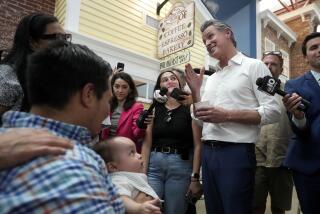In Massachusetts, voters’ discontent threatens Democrats
- Share via
Reporting from Boston — Steve Giosi and Liam Foley have been known to tip back a few pints on adjacent stools at the Galway House in this city’s Jamaica Plain neighborhood. But on Tuesday, they’ll part ways -- at least politically.
“I’m leaning toward him,” Giosi said one recent afternoon, nodding at the TV screen, which had been playing a seemingly continuous loop of ads both promoting and denigrating Republican U.S. Senate candidate Scott Brown.
“I’m a Democrat. I always have been,” said Foley, 55; to demonstrate his sense of loyalty, he pointed to his Tiger Woods cap. “I’m voting for Martha Coakley. I think she’s good.”
Countered Giosi, 48: “I think [President] Obama is scaring a lot of people with this health reform. Somebody’s going to have to pay for this. It’s not going to be a small bill.”
One person who could end up paying for it is Coakley, Massachusetts’ Democratic attorney general and once the overwhelming favorite to keep the late Sen. Edward M. Kennedy’s seat in the party’s hands.
Just days from the special election, most political experts rate the race a toss-up, an almost unimaginable development in a state where Democrats outnumber Republicans 3 to 1.
Brown, a state senator, had so little name recognition when he launched his campaign that he was better known for being the father of an “American Idol” semi-finalist (Ayla Brown, who competed in 2006). But he’s been pounding two issues of late: terrorism and the massive healthcare overhaul, which is in its final stages in Congress.
If he wins on Tuesday and is seated in time to vote on healthcare, he has pledged to help filibuster and kill the bill.
Several factors have been cited to explain Brown’s surge: He’s affable and telegenic, and has run an aggressive campaign, compared with Coakley’s more reserved effort.
But interviews with potential voters also revealed a persistent feeling that Obama and his allies in Congress have misread the public mood and have failed to concentrate on priorities such as the economy.
Half an hour outside Boston in Salem, Spike Tebo was having his hair cut at Killy’s Barber Shop. “People are tired of what’s going on with the Democratic Party,” Tebo said. “The healthcare bill, what is it -- 1,000 pages? Who can read that?”
“Some of them haven’t read it, you know that,” added the barber -- Killy himself, whose full name is Achilles Xerras. A lot of his customers, he said, “are going for Brown.”
Tebo, 74, and Xerras, 71, said they viewed Democrats as elitist and tone-deaf -- citing Coakley’s reference to the Senate post she would occupy as the “Kennedy seat.”
“Like he owned the seat,” Xerras said. “It’s the people’s seat” -- a line often used by Brown.
North of Boston in industrial Lynn, Tom Pedersen and two co-workers from the Stanley Elevator Co. ate lunch at the Atlantic Coast Seafood Market. They are worried that the healthcare bill will mean scaled-back union benefits.
“It’s a big issue for us,” said Pedersen, 50, over a carton of fried fish. “Do you bring everyone in America up to our level? Or bring our level down?”
Nervous union members are among the voters Brown has been courting.
Eric Fehrnstrom, one of Brown’s campaign advisors, described Massachusetts Democrats as split between “Harvard elites” and middle-class voters whose families have been party members for generations. “When they see a good working-class guy like Scott Brown, they’re drawn to him.” (For the record, Brown is a lawyer. But he does drive a GMC pickup truck.)
“It has everything to do with this feeling that the elites in Washington think they know better,” said Sissy Willis, a conservative activist and blogger from Chelsea who has been tracking Brown’s rise. The “tea party” movement, Willis said, has finally “found a specific race where it has made a difference” -- partly by reaching out to alienated Democrats and independents.
It isn’t just conservative and working-class voters who are moving to Brown.
Dining in Boston’s financial district, Jennifer Rogers, who voted for Obama, said she was disappointed that Democrats and Republicans weren’t working together on healthcare and other issues -- and she blamed both parties. “You’ve got no one voting based on what the people want,” said Rogers, 26, of Brookline.
Her friend Alycia Torres, 31, added: “I never thought we’d be this divided as a country so soon into his presidency.”
Rogers and Torres said they would vote for Brown, casting him as the sort of independent-minded politician Obama once appeared to be.
Rogers said she couldn’t vote for Coakley. “She’s so embedded in the Democratic Party, there will be no change.”
Raymond La Raja, a political scientist at the University of Massachusetts, Amherst, still expects Coakley to win, saying that Democrats have a greater capacity in the state to deliver voters to the polls. But he offered a caveat: “There’s a huge swath of disaffected independents” that could tilt the election.
And if the Democrats lose, they’ll be in store for a rough 2010 at the hands of an energized GOP, which would use Brown’s win as a model for congressional races nationwide.
In essence, La Raja said, the victory would be the first shot in what could be a revolutionary war -- a topic this state knows something about.
“It would be,” he said, “like the Battle of Lexington and Concord.”
More to Read
Sign up for Essential California
The most important California stories and recommendations in your inbox every morning.
You may occasionally receive promotional content from the Los Angeles Times.













